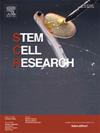Down syndrome (Trisomy 21) disease-specific human embryonic stem cell (hESC) lines, UMICHe003-A/UM152-1, UMICHe004-A/UM202-1, and UMICHe005-A/UM229-1
IF 0.7
4区 医学
Q4 BIOTECHNOLOGY & APPLIED MICROBIOLOGY
引用次数: 0
Abstract
Down syndrome (DS), the chromosomal disorder caused by trisomy of chromosome 21 (Tri21), presents many neurological conditions, including intellectual disability (ID), autism spectrum disorder (ASD), epilepsy, and Alzheimer’s disease (AD), and is the most common genetic cause of ID worldwide. Although some human chromosome 21 (HSA21) genes have been identified as key contributors to some of these pathologies, the mechanisms that link the triplication of HSA21 genes to most DS-related diseases remain largely unknown. To facilitate the discovery of HSA21 genes that underlie DS-related pathologies, we report here the establishment of three (3) female Tri21 disease-specific human embryonic stem cell (hESC) lines in the NIH hESC registry, UM152-1, UM202-1, and UM229-1. All three Tri21-hESC lines exhibit pluripotency, the ability to differentiate into three germ layers in vitro. These lines provide new human cellular models to study DS/Tri21 disease pathogenesis.
唐氏综合症(21三体)疾病特异性人类胚胎干细胞(hESC)系,UMICHe003-A/UM152-1, UMICHe004-A/UM202-1和UMICHe005-A/UM229-1
唐氏综合症(DS)是由21号染色体三体(Tri21)引起的染色体疾病,表现为许多神经系统疾病,包括智力残疾(ID)、自闭症谱系障碍(ASD)、癫痫和阿尔茨海默病(AD),是世界上最常见的遗传原因。尽管一些人类21号染色体(HSA21)基因已被确定为这些病理的关键因素,但HSA21基因的三倍与大多数ds相关疾病之间的联系机制仍在很大程度上未知。为了促进发现ds相关病理的HSA21基因,我们在此报告了在NIH hESC登记处UM152-1、UM202-1和UM229-1建立了三(3)个女性Tri21疾病特异性人胚胎干细胞(hESC)系。所有三种Tri21-hESC系都表现出多能性,能够在体外分化成三种胚层。这些细胞系为研究DS/Tri21疾病的发病机制提供了新的人类细胞模型。
本文章由计算机程序翻译,如有差异,请以英文原文为准。
求助全文
约1分钟内获得全文
求助全文
来源期刊

Stem cell research
生物-生物工程与应用微生物
CiteScore
2.20
自引率
8.30%
发文量
338
审稿时长
55 days
期刊介绍:
Stem Cell Research is dedicated to publishing high-quality manuscripts focusing on the biology and applications of stem cell research. Submissions to Stem Cell Research, may cover all aspects of stem cells, including embryonic stem cells, tissue-specific stem cells, cancer stem cells, developmental studies, stem cell genomes, and translational research. Stem Cell Research publishes 6 issues a year.
 求助内容:
求助内容: 应助结果提醒方式:
应助结果提醒方式:


